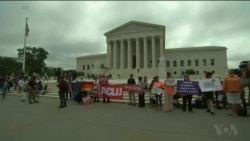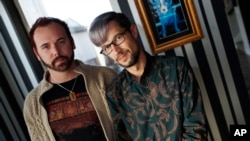In a closely watched case pitting gay rights against religious freedom, the U.S. Supreme Court on Monday narrowly ruled in favor of a Colorado baker who refused on religious grounds to make a wedding cake for a same-sex couple six years ago.
The justices voted 7-2 that the Colorado Civil Rights Commission violated the rights of baker Jack Phillips under the First Amendment’s clause on the free exercise of religion when it ordered him to provide cakes for same sex couples, despite his religious objection to gay marriage.
2012 Colorado case
Though a victory for Phillips, the ruling was notably narrow, with justices leaving aside the larger constitutional question of whether private businesses can refuse service to gay people, as a number have in recent years.
“The court wrote about the narrowest opinion it could write and still come up on the side of the baker,” said Susan Bloch, a constitutional law professor at the Georgetown Law Center. “Because it wrote a very narrow opinion and tried to decide the case as narrowly as possible, I don’t think it sets as important a precedent as some people feared it might.”
The case dates back to 2012, when Charlie Craig and David Mullins went to Masterpiece Cakeshop in Lakewood, Colorado, to order a custom cake for their wedding.
Phillips, a devout Christian, declined, saying doing so would amount to participating in a religious ceremony antithetical to his religious beliefs.
The couple complained to the Colorado Civil Rights Commission and later sued Phillips. The commission and state courts found that Phillips had violated Colorado’s anti-discrimination laws. Colorado is one of 22 states that prohibit discrimination on the basis of sexual orientation.
Phillips appealed the decision to the Supreme Court, arguing that the state’s anti-discrimination law violated his religious liberty and freedom of expression, both protected by the U.S. Constitution’s First Amendment.
Kennedy wrote for the majority
Justice Anthony Kennedy, who has authored some of the court’s key gay rights rulings in recent years, including a landmark 2015 decision legalizing gay marriage, delivered the majority opinion, writing that the Colorado commission “showed elements of a clear and impermissible hostility toward the sincere religious beliefs motivating (Phillips’) objection” to designing a cake for the gay couple.
But Kennedy, a centrist justice who often casts the deciding vote in an ideologically split court, stated in his majority opinion that the ruling was limited to Masterpiece, leaving open the possibility that future similar cases could be decided differently.
“The outcome of cases like this in other circumstances must await further elaboration in the courts, all in the context of recognizing that these disputes must be resolved with tolerance, without undue disrespect to sincere religious beliefs, and without subjecting gay persons to indignities when they seek goods and services in an open market,” he wrote.
While the court did not weigh in on Phillips’ free speech argument, it ruled that anti-discrimination laws, while necessary to protect the rights of gay people, “must be applied in a manner that is neutral toward religion.”
Welcomed, condemned
Phillips applauded the decision.
“The Supreme Court affirmed that the government must respect my religious beliefs about marriage,” he wrote in an opinion piece published in USA Today newspaper.
Kristen Waggoner of Alliance Defending Freedom, a conservative Christian group that represented Phillips, said the court was right to “condemn” Colorado’s antagonism “toward Jack’s religious beliefs about marriage.”
“Tolerance and respect for good-faith differences of opinion are essential in a society like ours,” she said.
Attorney General Jeff Sessions also welcomed the ruling.
“In this case and others, the Department of Justice will continue to vigorously defend the free speech and religious freedom First Amendment rights of all Americans,” Sessions said in a statement.
Last year, the Justice Department submitted an amicus brief in support of Phillips, drawing the ire of LGBTQ civil rights advocates.
While some civil rights advocates denounced the decision as an attack on equality, the American Civil Liberties Union, which argued the case on behalf of the couple, said the high court’s narrow ruling meant LGBTQ rights would remain protected.
“The court did not accept arguments that would have turned back the clock on equality by making our basic civil rights protections unenforceable, but reversed this case based on concerns specific to the facts here,” the ACLU said in a statement.







